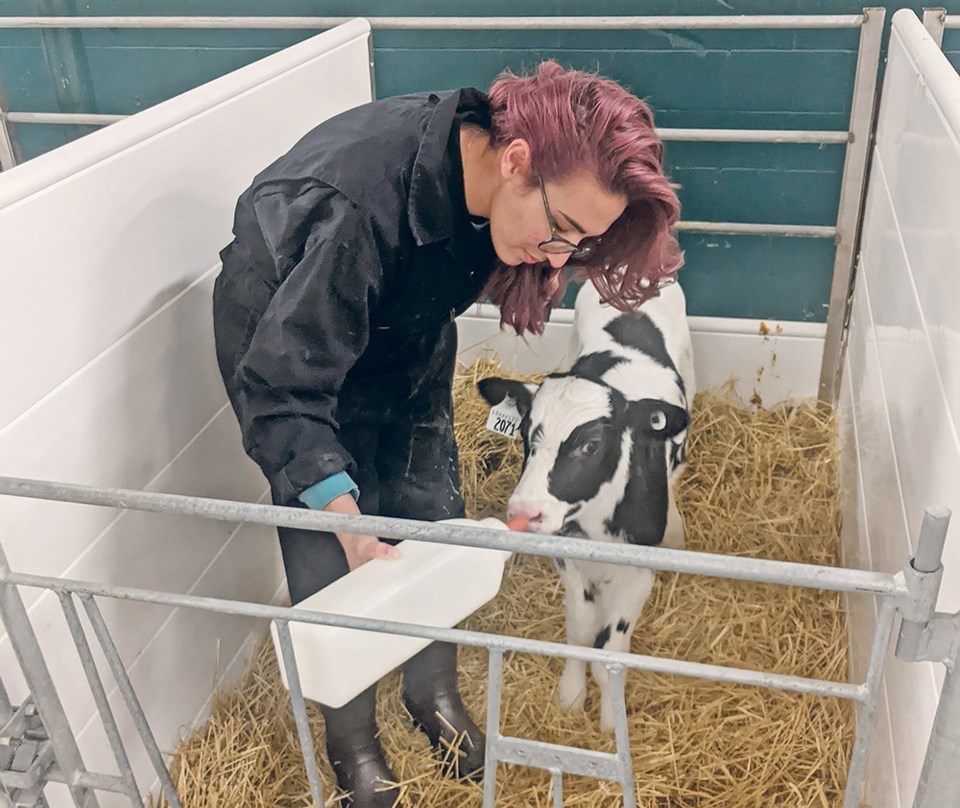WESTERN PRODUCER — A scientist has found that feeding a special probiotic supplement to newborn dairy calves gives them a head start by protecting their health during their vulnerable first weeks of life.
“I guess my biggest thing is calves are the future of the farm,” said Maddison Degenshein, who conducted the research for her Master of Science degree in ruminant nutrition at the University of Alberta.
“And so, I think it’s really important that we are putting the research, the time, the money and the energy into making sure that we’re supporting them and making them healthier and happier as we continue to progress and push these animals to be productive for us.”
Due to their underdeveloped immune systems, newborn calves are vulnerable to infections from ingested microbes, she said. Common ailments such as diarrhea can affect their growth and even potentially kill them.
In her research, newborn Holstein calves were fed beneficial strains of lactobacillus bacteria taken from the intestines of healthy Holstein heifer calves that had been weaned, said Degenshein. The goal was similar to that of human beings who take probiotics to boost the number of beneficial bacteria in their guts to ward off harmful microbes, she said.
Lactobacillus are used in everything from sourdough to yogurt.
“And we believed that by feeding it to these calves and promoting those healthy microbes, we’d be able to continue to promote healthy gut development in that first week.”
She found such calves “had a numerically lower incidence of being sick, so we fortunately had very healthy calves the whole time.”
Besides good weight gain, some calves also had reduced levels of stress, she added.
Such benefits could influence future milk production by the animals, said the university statement.
“So, it was quite positive results, all things considered,” said Degenshein.
Because such probiotics can easily be cultivated from the animals’ own manure, they could also potentially provide a more sustainable source that is native to bovines, she said in the university statement. Probiotic supplements developed from plant-based sources are commonly used in cattle feed, she said.
However, she added in an interview the results of her research have not yet been peer-reviewed and published in a scientific journal.
About 40 newborn calves were twice fed colostrum, which is typically the first milk produced within 24 hours after they’re born, she said. They need it within the first two to four hours of life for the best absorption of immunoglobulins, which are a type of protein that helps fight infection.
“So, it’s kind of their mom’s way of protecting them after they’re born, which is hugely important. And then we don’t typically see them growing or developing their own immune system for quite some time, so a few weeks, which leaves them vulnerable for that time.”
The calves were randomly assigned within the first week to one of four groups: milk replacer, transition milk, and with or without probiotics. Researchers made weekly observations about blood and fecal
The calves that were given the probiotic were fed it each morning for a week, said Degenshein. The research potentially opens the door to another way of ensuring the health of dairy cattle, which play an important role in agriculture, she said.
“We’ve made these incredible animals that are able to produce almost 100 pounds of milk in a day, and so I think that just giving them the opportunity or supporting them the best that we can is kind of what we’re here for.”




